Hunting
- Lisbeth
- Site Admin
- Posts: 65789
- Joined: Sat May 19, 2012 12:31 pm
- Country: Switzerland
- Location: Lugano
- Contact:
Re: Hunting
Will read it tomorrow 
"Education is the most powerful weapon which you can use to change the world." Nelson Mandela
The desire for equality must never exceed the demands of knowledge
The desire for equality must never exceed the demands of knowledge
- Lisbeth
- Site Admin
- Posts: 65789
- Joined: Sat May 19, 2012 12:31 pm
- Country: Switzerland
- Location: Lugano
- Contact:
Re: Hunting
Only introduction done 
Wildlife trafficking in the USA is a profitable crime, according to Assistant Attorney General John C. Cruden with the Justice Department’s Environment and Natural Resources Division. “Illicit transactions like this are fueling a global market and leading us closer to a day when rhinoceroses, elephants and countless other species are extinguished from the earth,” Cruden said in a statement.

Trophy imports into the USA in the last 15 years. Rhinocerous includes both Southern White (511 animals) and the critically endangered black Black species (2 animals). Cheetahs trophy imports are prohibited by federal law due to gross over-hunting.
Little by little I'll get through it all
Wildlife trafficking in the USA is a profitable crime, according to Assistant Attorney General John C. Cruden with the Justice Department’s Environment and Natural Resources Division. “Illicit transactions like this are fueling a global market and leading us closer to a day when rhinoceroses, elephants and countless other species are extinguished from the earth,” Cruden said in a statement.

Trophy imports into the USA in the last 15 years. Rhinocerous includes both Southern White (511 animals) and the critically endangered black Black species (2 animals). Cheetahs trophy imports are prohibited by federal law due to gross over-hunting.
Little by little I'll get through it all
"Education is the most powerful weapon which you can use to change the world." Nelson Mandela
The desire for equality must never exceed the demands of knowledge
The desire for equality must never exceed the demands of knowledge
- Lisbeth
- Site Admin
- Posts: 65789
- Joined: Sat May 19, 2012 12:31 pm
- Country: Switzerland
- Location: Lugano
- Contact:
Re: Hunting
A few short sections that have particularly caught my attention.
1. Elephant
Time to return Southern Africa’s elephants to appendix I again


Shortly Zimbabwe will be without elephants if they continue like they do now
Zimbabwe is facing a major collapse in its elephant numbers in the north of the country due to rampant poaching where figures have revealed collapses between 40 percent in Mana Pools and 75 percent in Matusadona and Chizarira. This data is according to a report on a survey released by Kevin Dunham at the Workshop to Develop Elephant Conservation Policy and Management Plan for Zimbabwe (2014).
Yet, Zimbabwe has been set a massive export quota of tusks as trophies, the biggest of the six countries – 1,000 annually, which has been in place since 2004. This means each year 500 elephants could be legally shot by trophy hunters and their tusks exported. The CITES trade datbase reveals that in the period 2003-2013, a total of over 28 metric tons of tusks have been exported from Zimbabwe by trophy hunters alone.
The report has revealed that “across Zimbabwe, economic operations on wildlife range areas are being seized by Zimbabwe’s political-military elites”. A small clique of Zimbabwe’s ruling party politicians and associates are turning to taking over profitable safari and wildlife conservancies rather than agricultural land as was previously favoured. The Born Free report shows that the current wave of wildlife-related land seizures is centred around the Save Conservancy and the Gwayi conservancy, the latter is the buffer zone of Hwange National Park where Cecil the lion was shot in July 2015.
Tanzania has lost 60 percent of its elephants in just five years, while neighbouring Niassa in Mozambique elephant populations plummeted from an estimated 20,000 to 10,300 during the same period
Too easy to avoid the numbers established by CITES
. But under the listing, trophies aren’t considered commercial products.
In Tanzania, elephant trophy hunting occurs in Game Reserves, Game Controlled Areas and community-owned Wildlife Management Areas, where trophy hunters pay license fees of US $7,500-$25,000, depending on the tusk size and type of weapon used.
Zambia is allowed trophy hunters an annual export of 80 elephant trophies (or 160 tusks). This despite the “official” 1982 ban on hunting elephants.
The 2010 datum may indicate a rising trend in South Africa. While poaching levels remain relatively low, South Africa has recently been found as an exit point for ivory from other parts of Africa for the illicit market in Asia. South Africa’s quota may serve as a loophole for the export of illegal ivory similar to what was discovered with the domestic trade in rhino horn in 2009 (see page 20).
Namibia’s export quota of 90 elephants doesn’t include permits to hunt “problem animals.” Under Namibian law, permits to shoot elephants deemed to be in conflict with people can easily be obtained. According to a CNN report in 2014, these permits are sometimes granted even before a “problem” animal has been identified. A hunter can then shoot any elephant a community declares to be a problem, whether it’s a problem or not. CNN reported that several desert elephants have been shot either for their meat or for the cash from the hunt fees.
1. Elephant
Time to return Southern Africa’s elephants to appendix I again

Shortly Zimbabwe will be without elephants if they continue like they do now
Zimbabwe is facing a major collapse in its elephant numbers in the north of the country due to rampant poaching where figures have revealed collapses between 40 percent in Mana Pools and 75 percent in Matusadona and Chizarira. This data is according to a report on a survey released by Kevin Dunham at the Workshop to Develop Elephant Conservation Policy and Management Plan for Zimbabwe (2014).
Yet, Zimbabwe has been set a massive export quota of tusks as trophies, the biggest of the six countries – 1,000 annually, which has been in place since 2004. This means each year 500 elephants could be legally shot by trophy hunters and their tusks exported. The CITES trade datbase reveals that in the period 2003-2013, a total of over 28 metric tons of tusks have been exported from Zimbabwe by trophy hunters alone.
The report has revealed that “across Zimbabwe, economic operations on wildlife range areas are being seized by Zimbabwe’s political-military elites”. A small clique of Zimbabwe’s ruling party politicians and associates are turning to taking over profitable safari and wildlife conservancies rather than agricultural land as was previously favoured. The Born Free report shows that the current wave of wildlife-related land seizures is centred around the Save Conservancy and the Gwayi conservancy, the latter is the buffer zone of Hwange National Park where Cecil the lion was shot in July 2015.
Tanzania has lost 60 percent of its elephants in just five years, while neighbouring Niassa in Mozambique elephant populations plummeted from an estimated 20,000 to 10,300 during the same period
Too easy to avoid the numbers established by CITES
. But under the listing, trophies aren’t considered commercial products.
In Tanzania, elephant trophy hunting occurs in Game Reserves, Game Controlled Areas and community-owned Wildlife Management Areas, where trophy hunters pay license fees of US $7,500-$25,000, depending on the tusk size and type of weapon used.
Zambia is allowed trophy hunters an annual export of 80 elephant trophies (or 160 tusks). This despite the “official” 1982 ban on hunting elephants.
The 2010 datum may indicate a rising trend in South Africa. While poaching levels remain relatively low, South Africa has recently been found as an exit point for ivory from other parts of Africa for the illicit market in Asia. South Africa’s quota may serve as a loophole for the export of illegal ivory similar to what was discovered with the domestic trade in rhino horn in 2009 (see page 20).
Namibia’s export quota of 90 elephants doesn’t include permits to hunt “problem animals.” Under Namibian law, permits to shoot elephants deemed to be in conflict with people can easily be obtained. According to a CNN report in 2014, these permits are sometimes granted even before a “problem” animal has been identified. A hunter can then shoot any elephant a community declares to be a problem, whether it’s a problem or not. CNN reported that several desert elephants have been shot either for their meat or for the cash from the hunt fees.
"Education is the most powerful weapon which you can use to change the world." Nelson Mandela
The desire for equality must never exceed the demands of knowledge
The desire for equality must never exceed the demands of knowledge
- Richprins
- Committee Member
- Posts: 75254
- Joined: Sat May 19, 2012 3:52 pm
- Location: NELSPRUIT
- Contact:
Re: Hunting
Thanks for the exerpts, Lis! 

Please check Needs Attention pre-booking: https://africawild-forum.com/viewtopic.php?f=322&t=596
- Lisbeth
- Site Admin
- Posts: 65789
- Joined: Sat May 19, 2012 12:31 pm
- Country: Switzerland
- Location: Lugano
- Contact:
Re: Hunting
Only the first two, there are quite a few to come......at least that's the idea 
"Education is the most powerful weapon which you can use to change the world." Nelson Mandela
The desire for equality must never exceed the demands of knowledge
The desire for equality must never exceed the demands of knowledge
- Lisbeth
- Site Admin
- Posts: 65789
- Joined: Sat May 19, 2012 12:31 pm
- Country: Switzerland
- Location: Lugano
- Contact:
Re: Hunting
Are lion hunters in South Africa shooting tame animals?
BY ALASTAIR LEITHEAD - 09 SEPTEMBER 2016 - BBC NEWS
The guide whistles as the large, dark-maned lion walks just a few metres from the car.
It looks around to face the American hunter and a single shot rings out in the South African bush.
The lion cartwheels from the force of the bullet – shocked and confused it roars, turns and quickly limps off into the bush.
“Shoot him again, shoot him again, shoot him again,” the professional hunter frantically urges, as the hunter reloads, firing into the trees.
The video cuts to see the lion lying dead and the American walking up to him.
“Hey you,” he says, “I’m sorry, but I wanted you,” before leaning down and kissing the lion.
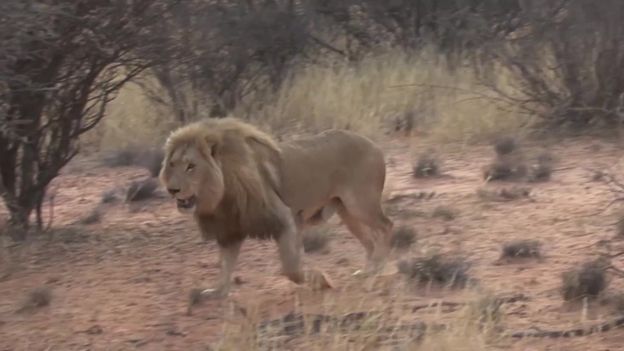
Image caption Footage of the lion hunt was taken in 2012 but has only recently been made public
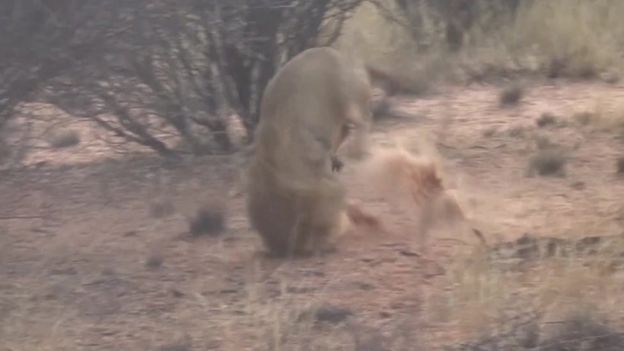
Image caption The impact of the close-range shot jolts the lion onto its head
The video was shot by Derek Gobbett, a safari cameraman brought in to make a souvenir for the 10 American hunters who had paid thousands of dollars each to shoot a lion.
But he says the way they went about was neither fair nor legal – that it was something known as “canned lion” hunting – more of a duck shoot than a lion hunt.
Hunting is big business for South Africa – it was worth $70m (£50m) in 2013 – but this is generally understood to be for wild animals, not those bred in captivity just to be shot.
‘It’s all just a lie’
Every year hundreds of lions are bred in captivity across South Africa for the purpose of being placed onto private game reserves for hunting.
“Eight lionesses were released [from captivity]literally the day before the clients arrived – in fact four were released as the plane was landing just down the road,” Mr Gobbett told the BBC.
“We shot that first lion probably within half-an-hour,” he said.
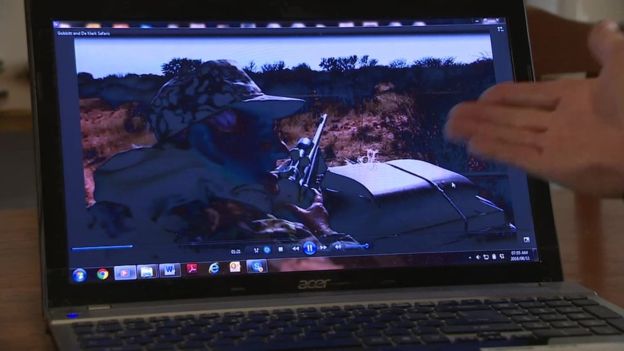
Image caption Campaigners question the ethics of shooting lions from such close range
He explained how the lions appeared to be used to humans – how one was shot while hiding in a hole, another up against a fence.
A new report by the International Fund for Animal Welfare (IFAW) says in the decade between 2004 and 2014, 1.7 million animals were killed for their “trophy”.
At least 200,000 of them were threatened species such as elephants, rhinos or lions.
IFAW found that the US was the biggest importer of stuffed animal heads, while South Africa was the biggest exporter – and lions were by far the most traded.
“Right from the start, the guys are told it’s very dangerous – that these are wild animals… and of course they take it all in,” Mr Gobbett said.
“It’s all: ‘You got so lucky, that was such an amazing shot.’ Slaps on the back: ‘You’re such a hero, look at what you’ve done – you have got your king of the jungle.’
“Meanwhile, it’s all just a lie.”
Arguments in support
The IFAW report says there are between 6,000 to 8,000 lions kept in captivity in South Africa, in up to 200 ranches.
“Canned” lion hunting is illegal in South Africa, but captive-bred lion hunting is allowed. Amid a raft of regulations there is a fine line between the two – and something which differs by province.
“All the lion hunting in South Africa is supposed to be with permits, and those are regulated hunts that have to be done to a certain criteria,” said Carla van der Vyver, chief executive of the South African Predator Association (SAPA).
“If such an activity has happened and it was not done to permit regulations it is definitely not a thing that SAPA will support,” she said in reference to the video footage.
SAPA does support captive-bred hunting, unlike the Professional Hunters Association of South Africa, which voted to ban the practice last year.
Trophy hunting in numbers
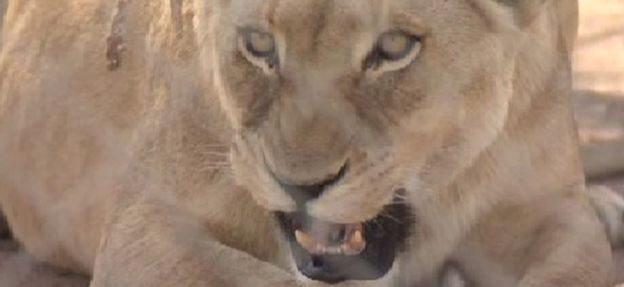
- Up to 1.7 million hunting trophies have been traded between nations between 2004 and 2014
- At least 11,000 lion trophies have been traded worldwide in 2004-13
- US was the biggest importer of stuffed animal heads, while South Africa was the biggest exporter
- About 200 lion breeding facilities in South Africa house between 6,000 and 8,000 lions
- Approximately 2,300 wild lions live in South Africa’s protected areas
- 107 different nations participated in trophy hunting trade in 2004-14
- Top 20 countries are responsible for 97% of trophy imports
Source: IFAW’s June 2016 report: Killing For Trophies – An Analysis Of Global Trophy Hunting Trade
“Mostly the benefits are extending the lion’s habitat, because it needs to be released in an ecological area – a large area,” said Ms Van der Vyver.
“It also requires for other animals to be re-introduced into the land – to be prey species.”
Other arguments in support of this form of hunting are that it protects the dwindling numbers of wild lions, and also managed breeding can strengthen the gene pool.
A certain number of wild lions can be killed each year – and some of the money raised used for helping with conservation efforts.
The International Union for Conservation of Nature (IUCN) has backed calls to push South Africa to ban the hunting of lions bred in captivity.
It passed a motion by a large majority at the World Conservation Congress, which is meeting this week in Hawaii, and is calling on South Africa to stop the captive breeding of lions for anything other than conservation.
But supporters of captive breeding argue it does contribute to conservation.
Serious questions
We were taken on a drive around a huge area of hunting land owned by Tienie Bamberger – there were five lions in an area between 500 and 1,000 hectares (1,235-2,471 acres), which he said it would take days to track and shoot.
He has expanded his initial plot of 200 hectares to 6,000 with the increased business over the last 13 years. His lions come from breeding farms.
He says conservation would be the first thing to suffer if hunting was banned.
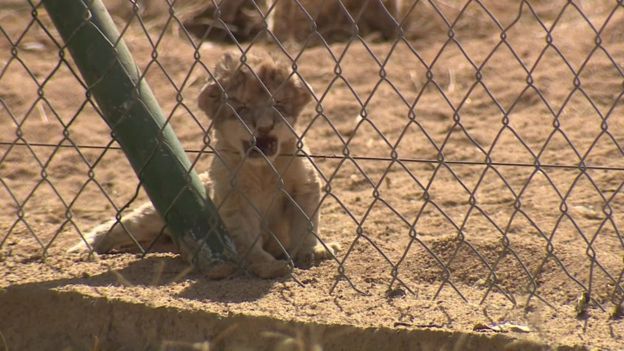
Image caption Lions are bred and grow up in captivity before being selected for a hunt
“The immediate effect would be the loss of habitat. We have more than 16 different antelope species we keep on this land which are also benefitting,” he said.
“There is a lot of controversy when it comes to the so-called canned lion industry, and it’s given a bad name to hunting in general, so we totally condemn any illegal hunting.”
The hunting video dates back to 2012, but has been recently released into the public domain.
There are many clips of the American hunters posing with the lions they had killed.
We showed it to environmental campaigner and journalist Ian Michler, who was the face of a film called “Blood Lions” last year – an investigation into the canned lion industry.
He said little has changed in the industry, criticising the way a lion was shot from a vehicle, from a short distance – and he highlighted the way the lion responded to a human whistle.
“We’re domesticating our lions. We are breeding them now under intense agricultural conditions just so people can kill them under these circumstances,” he said.
“There are serious ethical and ecological questions around that type of behaviour.”
Trophy import ban
We also visited a lion breeding farm – a three-day-old cub was playing in the metal fence while its mother looked on protectively.
There were 35 lions in the various enclosures – lions in most zoos certainly have less room.
While many organisations play by the rules, there are continuing reports of illegal hunts.
Perhaps the biggest lever for change in South Africa is a US government ban on importing animal trophies which was brought in following the outcry over the killing of Cecil the lion in Zimbabwe by an American dentist last year.
It has dramatically reduced the number of US hunters visiting, but hunters from Russia and the Middle East are on the increase.
The breeders certainly complain it’s been bad for business.
But it does nothing to help the thousands of lions, bred in captivity for hunting, that are no longer needed, and are left to grow up in small enclosures.
Read the full article: http://www.bbc.com/news/world-africa-37295358
BY ALASTAIR LEITHEAD - 09 SEPTEMBER 2016 - BBC NEWS
The guide whistles as the large, dark-maned lion walks just a few metres from the car.
It looks around to face the American hunter and a single shot rings out in the South African bush.
The lion cartwheels from the force of the bullet – shocked and confused it roars, turns and quickly limps off into the bush.
“Shoot him again, shoot him again, shoot him again,” the professional hunter frantically urges, as the hunter reloads, firing into the trees.
The video cuts to see the lion lying dead and the American walking up to him.
“Hey you,” he says, “I’m sorry, but I wanted you,” before leaning down and kissing the lion.

Image caption Footage of the lion hunt was taken in 2012 but has only recently been made public

Image caption The impact of the close-range shot jolts the lion onto its head
The video was shot by Derek Gobbett, a safari cameraman brought in to make a souvenir for the 10 American hunters who had paid thousands of dollars each to shoot a lion.
But he says the way they went about was neither fair nor legal – that it was something known as “canned lion” hunting – more of a duck shoot than a lion hunt.
Hunting is big business for South Africa – it was worth $70m (£50m) in 2013 – but this is generally understood to be for wild animals, not those bred in captivity just to be shot.
‘It’s all just a lie’
Every year hundreds of lions are bred in captivity across South Africa for the purpose of being placed onto private game reserves for hunting.
“Eight lionesses were released [from captivity]literally the day before the clients arrived – in fact four were released as the plane was landing just down the road,” Mr Gobbett told the BBC.
“We shot that first lion probably within half-an-hour,” he said.

Image caption Campaigners question the ethics of shooting lions from such close range
He explained how the lions appeared to be used to humans – how one was shot while hiding in a hole, another up against a fence.
A new report by the International Fund for Animal Welfare (IFAW) says in the decade between 2004 and 2014, 1.7 million animals were killed for their “trophy”.
At least 200,000 of them were threatened species such as elephants, rhinos or lions.
IFAW found that the US was the biggest importer of stuffed animal heads, while South Africa was the biggest exporter – and lions were by far the most traded.
“Right from the start, the guys are told it’s very dangerous – that these are wild animals… and of course they take it all in,” Mr Gobbett said.
“It’s all: ‘You got so lucky, that was such an amazing shot.’ Slaps on the back: ‘You’re such a hero, look at what you’ve done – you have got your king of the jungle.’
“Meanwhile, it’s all just a lie.”
Arguments in support
The IFAW report says there are between 6,000 to 8,000 lions kept in captivity in South Africa, in up to 200 ranches.
“Canned” lion hunting is illegal in South Africa, but captive-bred lion hunting is allowed. Amid a raft of regulations there is a fine line between the two – and something which differs by province.
“All the lion hunting in South Africa is supposed to be with permits, and those are regulated hunts that have to be done to a certain criteria,” said Carla van der Vyver, chief executive of the South African Predator Association (SAPA).
“If such an activity has happened and it was not done to permit regulations it is definitely not a thing that SAPA will support,” she said in reference to the video footage.
SAPA does support captive-bred hunting, unlike the Professional Hunters Association of South Africa, which voted to ban the practice last year.
Trophy hunting in numbers

- Up to 1.7 million hunting trophies have been traded between nations between 2004 and 2014
- At least 11,000 lion trophies have been traded worldwide in 2004-13
- US was the biggest importer of stuffed animal heads, while South Africa was the biggest exporter
- About 200 lion breeding facilities in South Africa house between 6,000 and 8,000 lions
- Approximately 2,300 wild lions live in South Africa’s protected areas
- 107 different nations participated in trophy hunting trade in 2004-14
- Top 20 countries are responsible for 97% of trophy imports
Source: IFAW’s June 2016 report: Killing For Trophies – An Analysis Of Global Trophy Hunting Trade
“Mostly the benefits are extending the lion’s habitat, because it needs to be released in an ecological area – a large area,” said Ms Van der Vyver.
“It also requires for other animals to be re-introduced into the land – to be prey species.”
Other arguments in support of this form of hunting are that it protects the dwindling numbers of wild lions, and also managed breeding can strengthen the gene pool.
A certain number of wild lions can be killed each year – and some of the money raised used for helping with conservation efforts.
The International Union for Conservation of Nature (IUCN) has backed calls to push South Africa to ban the hunting of lions bred in captivity.
It passed a motion by a large majority at the World Conservation Congress, which is meeting this week in Hawaii, and is calling on South Africa to stop the captive breeding of lions for anything other than conservation.
But supporters of captive breeding argue it does contribute to conservation.
Serious questions
We were taken on a drive around a huge area of hunting land owned by Tienie Bamberger – there were five lions in an area between 500 and 1,000 hectares (1,235-2,471 acres), which he said it would take days to track and shoot.
He has expanded his initial plot of 200 hectares to 6,000 with the increased business over the last 13 years. His lions come from breeding farms.
He says conservation would be the first thing to suffer if hunting was banned.

Image caption Lions are bred and grow up in captivity before being selected for a hunt
“The immediate effect would be the loss of habitat. We have more than 16 different antelope species we keep on this land which are also benefitting,” he said.
“There is a lot of controversy when it comes to the so-called canned lion industry, and it’s given a bad name to hunting in general, so we totally condemn any illegal hunting.”
The hunting video dates back to 2012, but has been recently released into the public domain.
There are many clips of the American hunters posing with the lions they had killed.
We showed it to environmental campaigner and journalist Ian Michler, who was the face of a film called “Blood Lions” last year – an investigation into the canned lion industry.
He said little has changed in the industry, criticising the way a lion was shot from a vehicle, from a short distance – and he highlighted the way the lion responded to a human whistle.
“We’re domesticating our lions. We are breeding them now under intense agricultural conditions just so people can kill them under these circumstances,” he said.
“There are serious ethical and ecological questions around that type of behaviour.”
Trophy import ban
We also visited a lion breeding farm – a three-day-old cub was playing in the metal fence while its mother looked on protectively.
There were 35 lions in the various enclosures – lions in most zoos certainly have less room.
While many organisations play by the rules, there are continuing reports of illegal hunts.
Perhaps the biggest lever for change in South Africa is a US government ban on importing animal trophies which was brought in following the outcry over the killing of Cecil the lion in Zimbabwe by an American dentist last year.
It has dramatically reduced the number of US hunters visiting, but hunters from Russia and the Middle East are on the increase.
The breeders certainly complain it’s been bad for business.
But it does nothing to help the thousands of lions, bred in captivity for hunting, that are no longer needed, and are left to grow up in small enclosures.
Read the full article: http://www.bbc.com/news/world-africa-37295358
"Education is the most powerful weapon which you can use to change the world." Nelson Mandela
The desire for equality must never exceed the demands of knowledge
The desire for equality must never exceed the demands of knowledge
- Lisbeth
- Site Admin
- Posts: 65789
- Joined: Sat May 19, 2012 12:31 pm
- Country: Switzerland
- Location: Lugano
- Contact:
Re: Hunting
"Education is the most powerful weapon which you can use to change the world." Nelson Mandela
The desire for equality must never exceed the demands of knowledge
The desire for equality must never exceed the demands of knowledge


